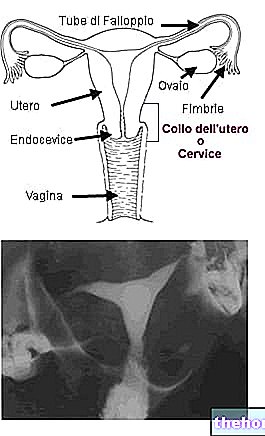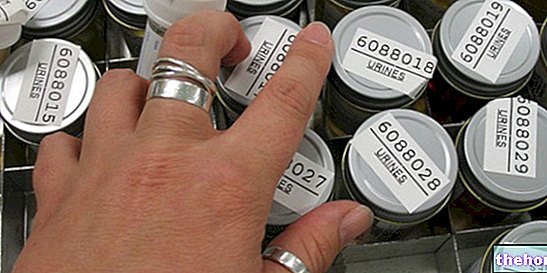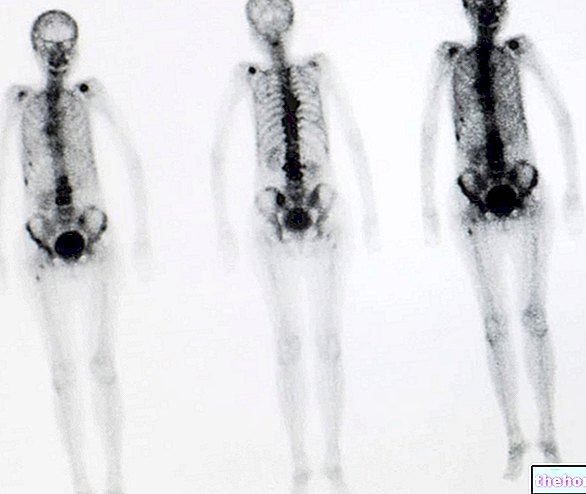Generality
Creatininuria is the amount of creatinine in the urine.
This test provides useful information on the functional efficiency of the kidneys, being the latter in charge of filtering the blood.
Creatinine measurement is often required to measure creatinine clearance and is performed on 24-hour urine collection.
What's this
- Creatinine is the breakdown product of creatine phosphate (or phosphocreatine). This molecule is mainly located in skeletal muscle and in the heart. For these tissues, creatinine is an immediately usable source of energy for contraction.
- Creatinine production is related to creatine metabolism. During the absorption of this amino acid by the muscles, a small amount is irreversibly and almost constant over time converted into creatinine.
- The creatinine produced flows into the blood and is subsequently filtered by the renal glomeruli. The fate of the molecule is to be completely eliminated in the urine, without being reabsorbed or undergoing significant changes in the renal tubules.
- When renal filtration is normal, the serum creatinine concentration and the amount eliminated in the urine remain constant and are related to muscle mass.
- If the presence of creatinine in the blood is too high, it means that the kidneys cannot pass it into the urine, so they are not doing their job well.
- In the presence of a pathological condition that compromises the renal filtration capacity, creatinine is not eliminated properly; urinary and plasma values are affected.
Because it is measured

Since all creatinine filtered by the glomerulus is completely excreted (there is no reabsorption), its level in the urine constitutes a sensitive and specific index of renal function. If this is too low it means that the filtering activity of the kidney is impaired and consequently there will be an increase in the concentration of creatinine in the blood.
The creatininuria test is also performed to monitor the treatment of kidney diseases (for example, in dialysis patients) or the function of the same organs during certain types of therapies.
Normal values
Reference ranges for creatininuria are as follows:
- Normal values for women: 600 - 1800 mg / 24h;
- Normal values for men: 800 - 2000 mg / 24h.
However, it should be considered that the amount of creatinine produced by the body depends on age, the development of muscle mass and the physical exercise performed: for this reason, the concentration is slightly higher in men than in women and children.
High Creatininuria - Causes
High creatinine in the urine can be caused by:
- Fever
- Fast
- Muscle hypertrophy
- Diabetes mellitus;
- Acromegaly;
- Enlargement or damage of the kidney vessels (glomerulonephritis)
- Infections affecting the kidneys (pyelonephritis);
- Kidney stones;
- Reduced blood supply to the kidneys due to heart failure, atherosclerosis or complications of diabetes
- Prostatic disorders or other causes of urinary tract obstruction;
- Muscle hypertrophy;
- Sporting excesses;
- Trauma or injury to the muscle;
- Burns.
An increase in urinary excretion may be associated with the intake of drugs, such as captopril and corticosteroids.
Low Creatinuria - Causes
A decrease in urinary creatinine concentration can be due to various situations such as:
- Kidney failure;
- Muscle disorders (e.g. muscular dystrophy, myositis);
- Anemia;
- States of toxic-septic shock;
- Urinary tract obstruction (prostate adenoma, nephritic colic);
- Acute or chronic glomerulonephritis;
- Renal polycystosis;
- Hyperthyroidism;
- Old age.
How it is measured
Creatininuria is measured on a 24-hour urine sample.
Preparation
The test involves the collection of the urine emitted during a whole day (for example: from 8 in the morning to 8 the following day), in the same clean plastic container and without adding additives. Always close the container tightly and store it in a cool, dark place.
In the 8-12 hours preceding the examination of creatininuria, it is important to avoid practicing intense physical exercise. This activity can, in fact, alter the values.
In addition, the patient may be required to fast for the night prior to blood collection or to refrain from eating meat.
Interpretation of Results
The "increase of creatinine in the urine indicates an acute or chronic deterioration of renal function, which can be caused by inadequate perfusion (shock, haemorrhage, heart failure), by nephropathies (glomerulonephritis, pyelonephritis, acute tubular necrosis, etc.) or by obstructions of the urinary tract.
In chronic kidney disease, accompanied, in particular, by a reduction in muscle mass, creatininuria tends to decrease. Low levels of creatinine in the urine can also be caused by anemia, muscle wasting, and debilitating states.
It should also be remembered that the results of the analyzes must be evaluated as a whole by the general practitioner, who knows the patient's medical history.























-nelle-carni-di-maiale.jpg)




